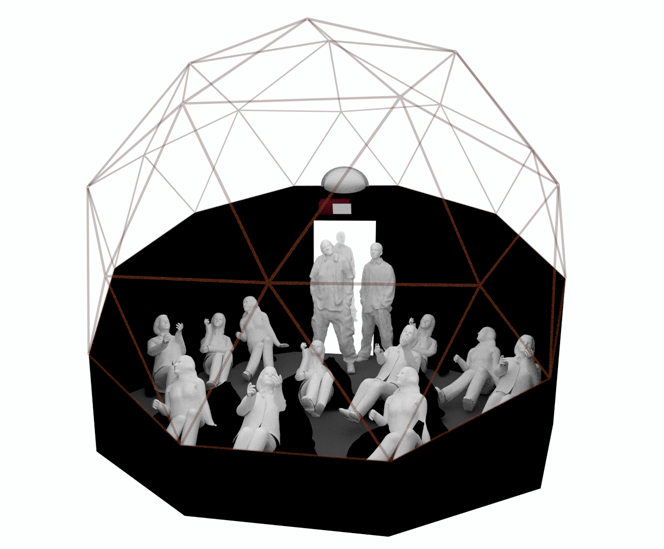Research
We are a hub for experimental humanities pedagogy, public-facing and community-engaged projects, and collaborative interdisciplinary initiatives
Our interdisciplinary topic-based clusters emerge organically out of shared faculty interests and offer a framework for rethinking how we “do” the humanities, using the pervasive reach of technological change as a jumping-off point. In unique ways, each cluster considers how educational and scholarly approaches can take better advantage of available resources (human, technological, intellectual, and more) to enhance learning, scholarship, and community engagement in the world.

EH labs incubate exciting and varied collaborative projects that combine experimental research methods with critical thinking about how such forms function as a part of cultural, social, and political inquiry. Projects are often in partnership with local organizations and community stakeholders and aim to radically recenter local concerns, while placing them in global contexts.
EH senior projects take many forms and topics are wide-ranging depending upon ones primary program(s) of study. However, each senior project engages with one or more of the core questions and concerns of the concentration, including:
In ongoing conjunction with the International (Digital) Dura-Europos Archives, the Center for Experimental Humanities (EH) is proud to present the IDEA Lab at EH, a biweekly workshop facilitating student-led research at the intersection of the humanities and data science. The IDEA Lab at EH provides students with hands-on experience and internship opportunities in the developing field of digital archiving in GLAM (Galleries, Libraries, Archives, and Museums) settings. IDEA and Linked Open Data aim to create an accessible, multi-lingual future of information management. Within the context of Wikidata, students learn to use the format of Linked Open Data, an information system emerging as the “best practice” in GLAM organizations as they update their materials for the digital age. Students working in the on-campus IDEA Lab are uniquely positioned for internship opportunities, and help humanities researchers look to the future while simultaneously re-integrating the past.
IDEALab Leader/Coordinator: Anne Hunnell Chen
IDEALab Peer Mentors: Samantha Simon ‘26 and Leah Neuberger ‘27
Learn more about the project: https://duraeuroposarchive.org/
The SEID Lab utilizes virtual technology such as AR/VR and game development, and spatial technology such as maps and drones, to create immersive experiences in the humanities and sciences. We are a collaborative, interdisciplinary lab that explores the intersections between technological methods to innovate unique experiences tailored to each project. Our pilot project includes the digitization of ancient Chinese oracle bone inscriptions accompanied by a VR experience that explores their creation, in collaboration with Huiwen Li and the Chinese Department. This project includes Media Corps students Jasper von Studnitz and Kateryna Panikhina, Media Corps alum Anna Likhanova and Neil Bhatia, and the EH Developer Misha Alia Awad. The SEID Lab was awarded a grant from the Li-hua Ying Memorial Fund to continue the development of the Oracle Bone project in the Fall of 2025.
In an age of mass extinction, what does it mean to decolonize place and form? In what ways are ecological issues entangled with histories of racism, sexism, and economic disparities? A.T.E. is a lab for transdisciplinary experiments across media with focus on the messy and surprising links between human, ecological and technological landscapes. Emphasis is placed on ways in which collective and interdisciplinary creative practices might collapse hierarchies, cultivate curiosity in a “more-than-human world” and (re)imagine alternative ecological and social futures. A.T.E. lab kicked off its inaugural year with a collection of multimedia works (drone footage, 360 video, writing, and virtual simulations) focused on vultures and connections to shifting ecologies and land use in the Hudson Valley, NY.
Projects under A.T.E. Lab include:

The Digital History Lab (DHL) is an innovative process-driven humanities laboratory. We focus our work on the production of local history projects with the aim to foster an exchange between Bard College and the strong community of public history— e.g., citizens, public servants, historical societies, town libraries—in the Hudson Valley. We offer as our primary contribution to this community interactive digital representations of our shared local environs with the hope that we can use new humanities practices to expand the traditional constraints of history and make it accessible to more audiences.
Projects under the DHL include:
AppleDB: Apples of New York Cultivar Database
IMAL is a mobile collaborative framework for the creation and development of critical and structurally novel immersive media artworks. We test out specific ideas about how and why immersive illusions might be used in art contexts through the creation of unique projects. IMAL engages with questions such as: “How and why do humans aspire to create increasingly realistic simulations of lived experience? What kinds of intellectual and emotional experiences (if any) are intrinsic to 360-video or virtual reality? What kinds of new artistic expressions are made possible by immersive video and virtual reality? Projects under IMAL include:
• Trading Futures, Ben Coonley (2016)
• Look Inside, Hugh Hopkins (2017)
The Mobile History Van uses digital technology to record and publish local history, and has worked closely with a local library and museum on digitizing archival materials and recording community history. Emphasis is placed on collecting stories from often ignored members of rural and urban communities near Bard’s campus.
Please join EH Media Corps member, Maha Abdulwahab tomorrow for “Finding a Sense of Home,” an event aimed to facilitate the sharing of stories and experiences for newcomers to the United States, fostering community through fun activities, and connecting international students at Bard College. In addition, there will be an introduction to the new season of our podcast, “Bard Beyond Borders” inviting everyone to be a guest or storyteller.
This cluster asks how and whether the dichotomy of “attention vs. distraction” describes our present situation in the context of the digital age, as well as how we can move beyond this opposition and towards a more nuanced framework for understanding a spectrum of different types of attention and our relationships to them. It explores the assumptions about attention that are embedded in the undergraduate liberal arts experience, and how what the cluster learns might speak to social concerns beyond the academy.
The EH Food Cluster brings together an interdisciplinary group of faculty and community stakeholders who all have scholarly, teaching, and/or community engagement in food as a platform to further our understanding of the world.
This cluster brings together scholars and practitioners to consider the potential of thinking about and through sound. Recent years have witnessed a sonic turn in the humanities and beyond. Many working in the fields of anthropology, literature, urban studies, history, media studies, and the arts have increasingly shifted their attention to sound as both an expressive medium, a material, and a critical object of inquiry.
The nybble cluster aims its focus on “hacking practices” and “hacking culture”. It seeks to explore the ways we learn about and interact with technologies while grappling with the implications of information security and data privacy, as well as examining current and imagining new ways of existing within the cyber-realm.
Below are a sample of senior projects created by EH students.
by Lin Barnett (2019)
Visit Cedar Hill (now Annandale-on-Hudson) as it stood over a century ago, reconstructed in virtual reality. This interactive project retells an important aspect of Hudson Valley History, its mill communities, which do not get preserved in the archeological record and are not as closely maintained as its neighboring communities of Bard College and Montgomery Place. The project analyzes the structures’ changing purposes, as well as their changing architectural qualities, to trace the story of the hamlet’s decline.
Learn more here: https://digitalcommons.bard.edu/senproj_s2019/209/
by Anne Comer (2019)
The Bard College campus dormitory known as Ward Manor has a rich and fascinating history. Using ethnographic research and multimodal methodology, this study has revealed a heretofore unknown story of the residents who lived out their lives in a collective residential community and are buried in the Ward Manor Cemetery. The story of this facility is explored as part of a more significant social and philanthropic endeavor within the United States in the early twentieth century. No longer forgotten, this critical aspect of Bard College is brought to life through this research.
Learn more here: https://digitalcommons.bard.edu/senproj_s2019/76/
by
This study aims to explore the potential of the social networking platform Twitter in redefining literature. Focusing on the brief, fragmented, interactive and democratizing nature of text that takes the form of tweets, it analyzes the platform’s functions in negotiating the aesthetics of language, mediating human creativity with computation, and shifting the power relations in the production and consumption of literary products. While the question underpinning the study is “What constitute literariness today?”, This project looks at poetry, fiction and essays produced on Twitter with the ambition of offering insights into the field of cultural production at large in the age of Web 2.0.
Learn more here: https://digitalcommons.bard.edu/senproj_s2015/68/
by Emma Washburn (2019)
Learn more here: https://digitalcommons.bard.edu/senproj_s2019/31/
by
With efforts to broaden participation in computing by integrating CS education into humanities and developing more critical pedagogy, this research focuses on teaching computing in a post-secondary Spanish literature class through analyzing Afro-Cuban poetry. Its goal was to evaluate how participants may use Twine to reflect on Afro-Cuban poetry and their own identities. A group of 5 participants, one professor, and five students, learned how to use Twine to create interactive narratives reflecting on “El apellido,” a poem by Afro-Cuban poet Nicolás Guillén. Through analyzing researcher notes, participants’ projects, post-workshop surveys, and interviews, the research revealed that students were able to engage with themes of identity through poetic analysis using Twine. Participants integrated their own identities into their projects, while also engaging with the literary themes of the poem. The experiences of the professor and a reluctant student are also highlighted in this work. This research shows how Twine can be used as a creative pedagogical tool to both teach students computing, how to analyze poetry using digital literacy methodologies, and empower them to think critically about their own identities.
Learn more here: https://digitalcommons.bard.edu/senproj_s2022/186/
by
“Hispaniola” is the English version of the Spanish word “Española.” The island in our present day is known as “Hispaniola.” Even after the Spanish colonizers gained knowledge that the Taíno people of the island called the island “Quisqueya,” they continued on calling the island its Spanish name “Española” and in turn the English version “Hispaniola.” I argue that the island should be known as “Quisqueya”, not “Hispaniola.” Even though the word “Quisqueya” is still the Spanish version, or Spanish sounding, of the original Arawak word, it is still the closest name we have to be able to connect to the original identity of the island.
Learn more here: https://digitalcommons.bard.edu/senproj_s2022/254/